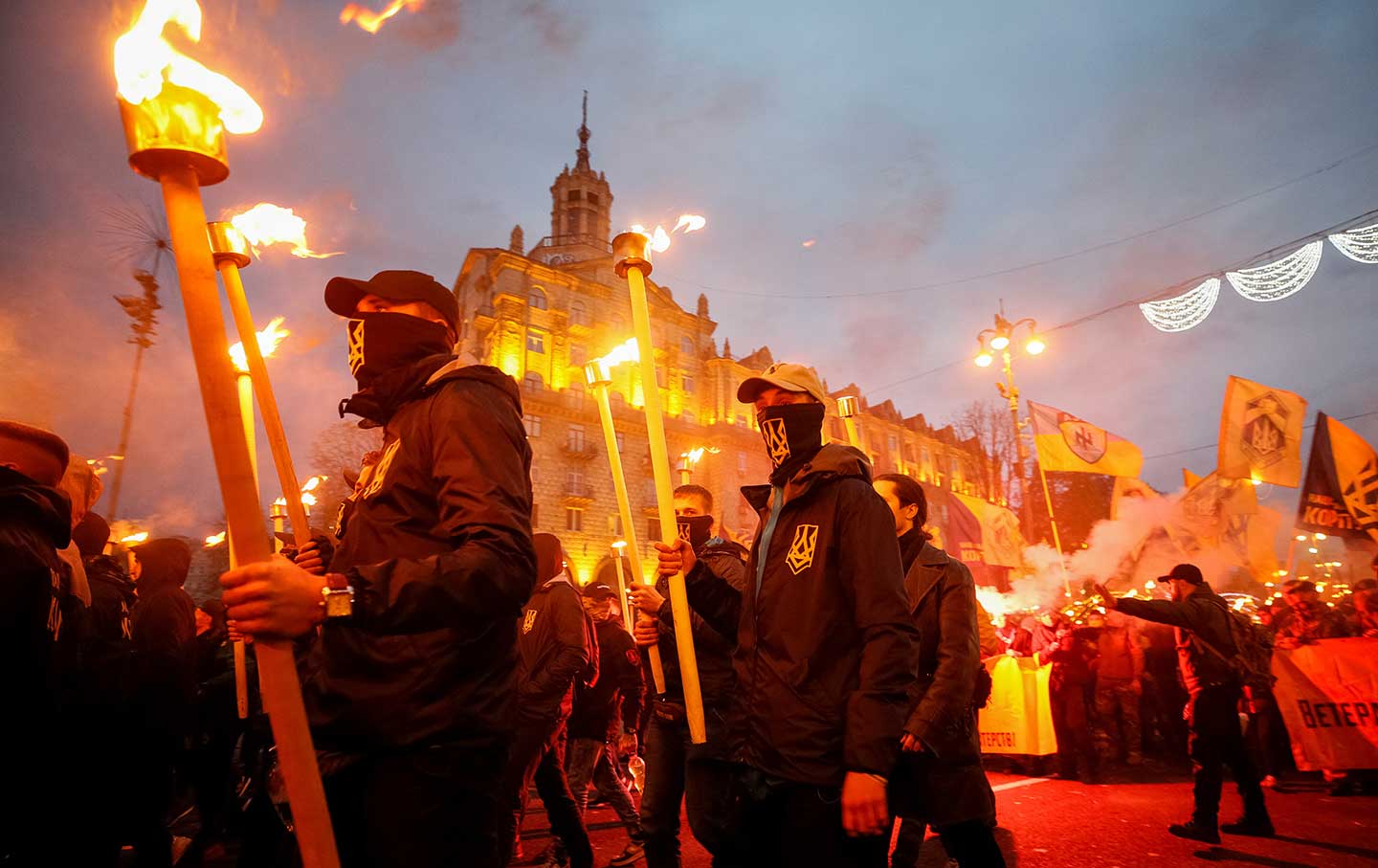Here’s how Ukraine was being reported by the West before the war.
Today, increasing reports of far-right violence, ultranationalism, and erosion of basic freedoms are giving the lie to the West’s initial euphoria. There are neo-Nazi pogroms against the Roma, rampant attacks on feminists and LGBT groups, book bans, and state-sponsored glorification of Nazi collaborators.
These stories of Ukraine’s dark nationalism aren’t coming out of Moscow; they’re being filed by Western media, including US-funded Radio Free Europe (RFE); Jewish organizations such as the World Jewish Congress and the Simon Wiesenthal Center; and watchdogs like Amnesty International, Human Rights Watch, and Freedom House, which issued a joint report warning that Kiev is losing the monopoly on the use of force in the country as far-right gangs operate with impunity.
Five years after Maidan, the beacon of democracy is looking more like a torchlight march. A neo-Nazi battalion in the heart of Europe
If you whitewash NAZI POGROMS just because you want to beat Russia, fuck you. Siding with far-right fascists to defeat far-right fascists doesn’t make you the good guy. There is no lesser of two evils here.
If you dismiss any criticism of Ukraine as Russian propaganda, you might want to ask why the rest of the world, including the West, was concerned about Nazism in the area and then suddenly changed their tune only after the war started.
We should be getting both sides into peace negotiations, not prolonging the bloodshed and providing Nazis with illegal cluster bombs



Yeah Russia is a weird case because it is a very nationalist country and has swung massively to the right on social questions since the fall of the USSR, and there were may fascist groups that emerged there after that, similarly to the rest of Eastern Europe (National Bolsheviks are only the most well-known example), and it has had problem with racism and racist violence.
Nevertheless it’s interesting that the Russian state’s nationalism, due to its history, and due to the pragmatism of the state, is willing to crack down hard on these groups.
I’d add tho that fascists can dislike other fascists, especially of other nationalities, and that Nazism is just one type of fascism. There has legitimately been an issue with far-right individuals in groups like Wagner, which should surprise no-one if you’ve ever actually met or interacted with people who have experience as private security, many of whom are ex mercenaries, etc…
Nationalism is simply the inevitable outcome for any country that has been colonized by a foreign imperialist power.
It is a very potent weapon, that can be harnessed for chauvinist purpose (as in European imperialism where the concept was first originated) or for anti-colonial struggle (nearly all of the post-war decolonization and independence movements had strong component of nationalism - from the Chinese communists and nationalists fending off Japanese invaders in the early 20th century, all the way to today’s West Africa’s struggle against their French colonizers).
Without nationalism, your state will be quickly disintegrate into dozens of provincial authorities and constant civil war between various warlord factions. Like it or not, national consciousness is what holds the state together when it comes to resisting foreign colonial powers.
I agree with you pretty much completely, if by nationalism we simply mean an ideological position or sets of policies which emphasize most immediately the importance of securing the interests of the nation-state as a polity or of acquiring it in the first place. Nationalism as a short-to-medium term tactic is often politically necessary, but in the long-term is has to be overcome. We shouldn’t underestimate the dangers of the fact that, for most nationalists, nationalism has more substantial content and is more final as an objective than this very deflated, tactical definition I’ve just given.
Pragmatically I agree that there are fairly clear reasons why, historically, national-liberation movements, even when Marxist, have also been equally nationalist, or have had bases of their political movements which are more nationalist and less Marxist than their leadership. Namely, that the securing of the national interests is a first priority and is understood by the people of that region as such, and so if the most useful means of ensuring popular support. But this is a pragmatic consideration and depends on the content of the nationalism, which can go beyond the pretty deflationary characterization I gave above.
This is also, from what I understand, why there is continued immense respect in the PRC for Sun Yat-Sen and why there is even a remnant of some degree of respect for the Kuomindang and Jiang Jieshi, given the importance of the latter in the unification of China during the Warlord Period. But the Kuomintang is also the best example of the risk of nationalism, especially when it is not guided by communists. Indeed the Kuomintang became more and more fascist as time went on. One of the reasons why nationalism is so problematic is that if the movement ends up more nationalist than communist then it risk moving towards accommodation with capitalism and imperialism. You see this all over the Global South since the postcolonial period after WW2. Nationalist third world governments, dominated by their petit-bourgeois, have continuously proven willing to cowtow to Western imperialist interests by serving as local elites in neocolonial economic arrangements. Nationalism, unless it is pragmatically utilized by revolutionary Communists/Marxists, greatly risks devolving, especially if the base of the support of the nationalist movement is not largely proletarian and so, as Marx, Lenin and Stalin noted, risks identifying their interests with small property and land-ownership and kulak social ascension, as opposed to the socialization of the means of production.
An even more spectacular and important example is the Khmer Rouge, which was in no way substantively Marxist or Communist save in name, and closer to fascistic, but which shows the extreme dangers of nationalism even when there are communists in the movement.
We should also note that the Bolsheviks were not initially nationalistic at all, despite Russia’s underdevelopment, tho we can see the stalinist policy of ‘Socialism in One Country’ as a form of tactical nationalism as a response to the failure of permanent international revolution.